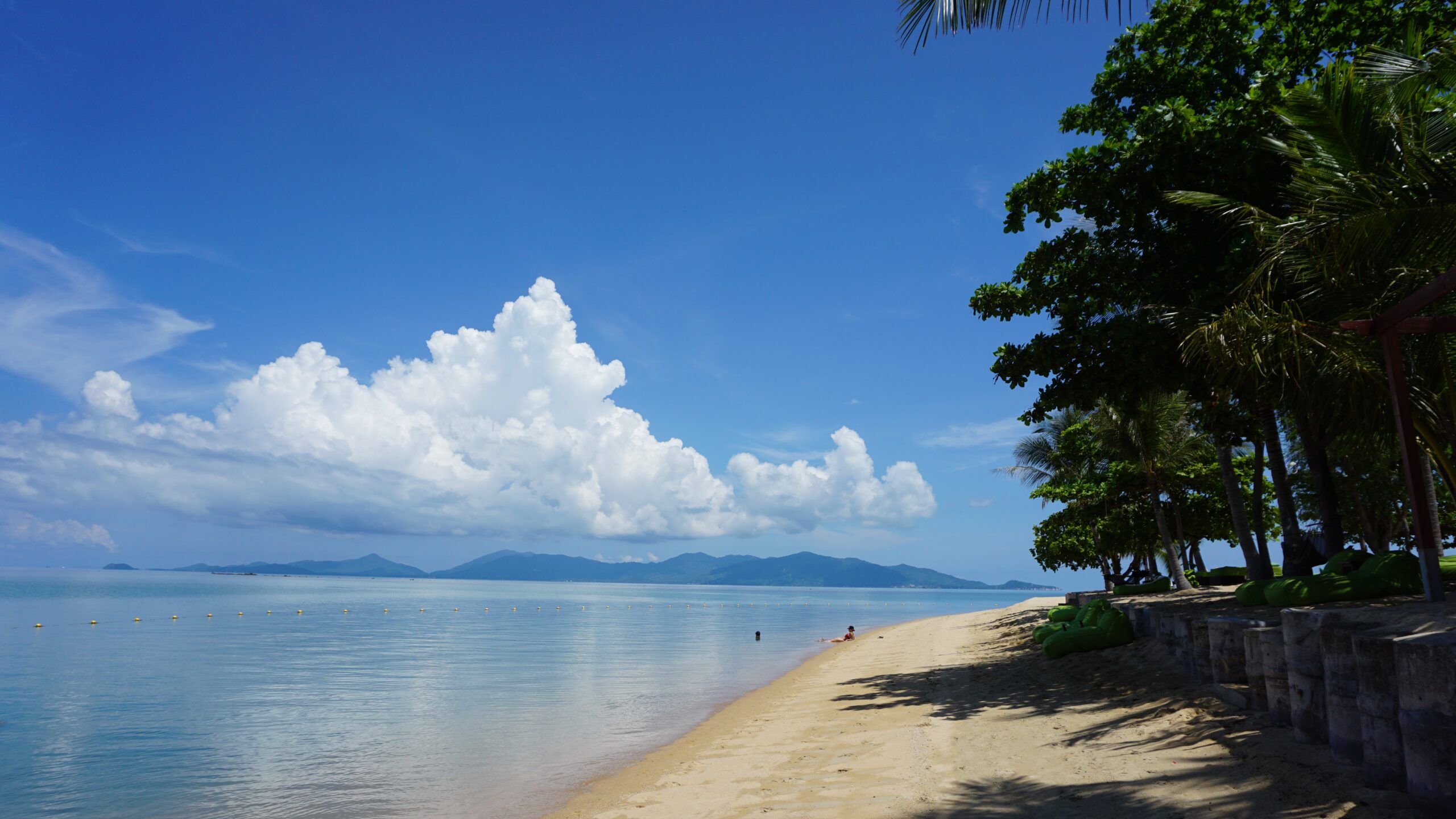Is Koh Samui Safe to Visit? 9 Tips to Know
So, is Koh Samui safe to visit? Let’s cover nine tips you should know before you visit Koh Samui!
The short answer is yes, Koh Samui is safe to visit, and it’s one of the safest places in Thailand you could visit.
But if you’re not from Thailand or haven’t spent much time in the country, there are a few things you should be aware of before coming.
If you’re wondering, is Koh Samui safe at night? It’s also perfectly safe at night too, you have nothing to worry about, but be cautious of your surroundings.
Also, you should watch out for a few scams in Koh Samui when visiting; I’ll include a few in this list. Refer to my other article for an extended list of scams in Thailand.
Avoid Beaches with Red Flag
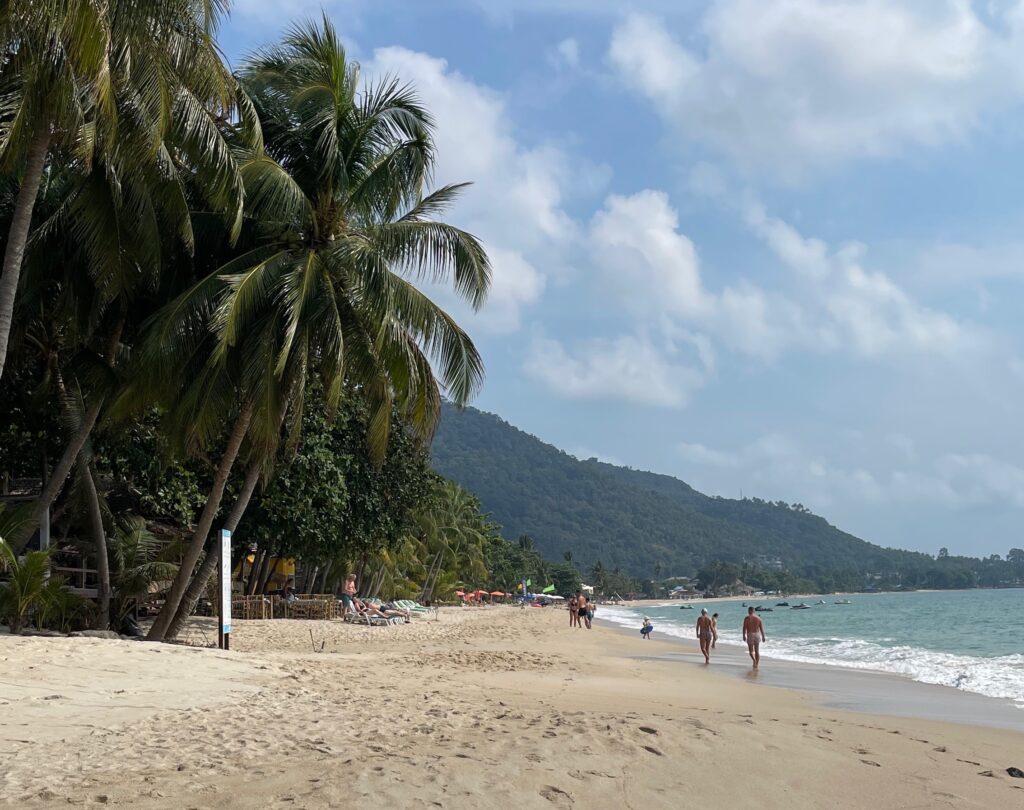
When you visit any beach in Koh Samui, or anywhere else, it is important to be mindful of safety precautions. One such precaution is being aware of warning signs on the beach, such as red flags.
During the off-season months from October through December, the waters in Koh Samui can become rather aggressive. During this time, you may notice red flags planted on the beach. It is advised to stay away from these beaches when you see a red flag.
On the other hand, January till September is considered the dry season, and red flags are less likely to appear compared to the off-season months. But still, even during the dry season, you may see red flags on the beach for your safety.
A red flag serves as a warning for various dangers, including strong currents, rough surf, and other hazardous conditions that could pose a risk to swimmers. These conditions may include rip currents, powerful underwater currents that can pull swimmers away from shore and make it difficult for them to return safely.
Instead of swimming in areas marked with a red flag, engaging in other activities on the beach, such as relaxing or visiting a restaurant, would be better. Alternatively, seek out beaches where swimming has been deemed safe by lifeguards and local authorities.
Most of the beaches in Koh Samui have lifeguards, but some don’t. By the way, under no circumstances should you go swimming at night. It’s not a good idea, and you’re risking your life.
RELATED: Best & Worst Time to Visit Koh Samui
Don’t Drink the Tap Water
When you visit Koh Samui or anywhere else in Thailand, it is really important to avoid drinking tap water.
The tap water in Thailand is not safe to drink, despite efforts by the Thai government to improve its quality. As a tourist or visitor, it is recommended that you exercise caution and refrain from consuming tap water directly at any time.
Drinking tap water can pose various risks, including stomach sickness, flu, diarrhea, and more. To ensure a safe and healthy experience during your stay in Koh Samui, Phuket, Bangkok, or anywhere else in Thailand.
It is highly advisable to rely on alternatives such as bottled or filtered water for drinking purposes. This also applies for brushing your teeth.
Hotels/resorts usually have restaurants or small shops selling water; otherwise, there are 711’s convenience stores open 24/7 everywhere in Koh Samui.
The last thing you want is stomach problems to hinder your enjoyment while visiting Koh Samui!
Taxi Scams
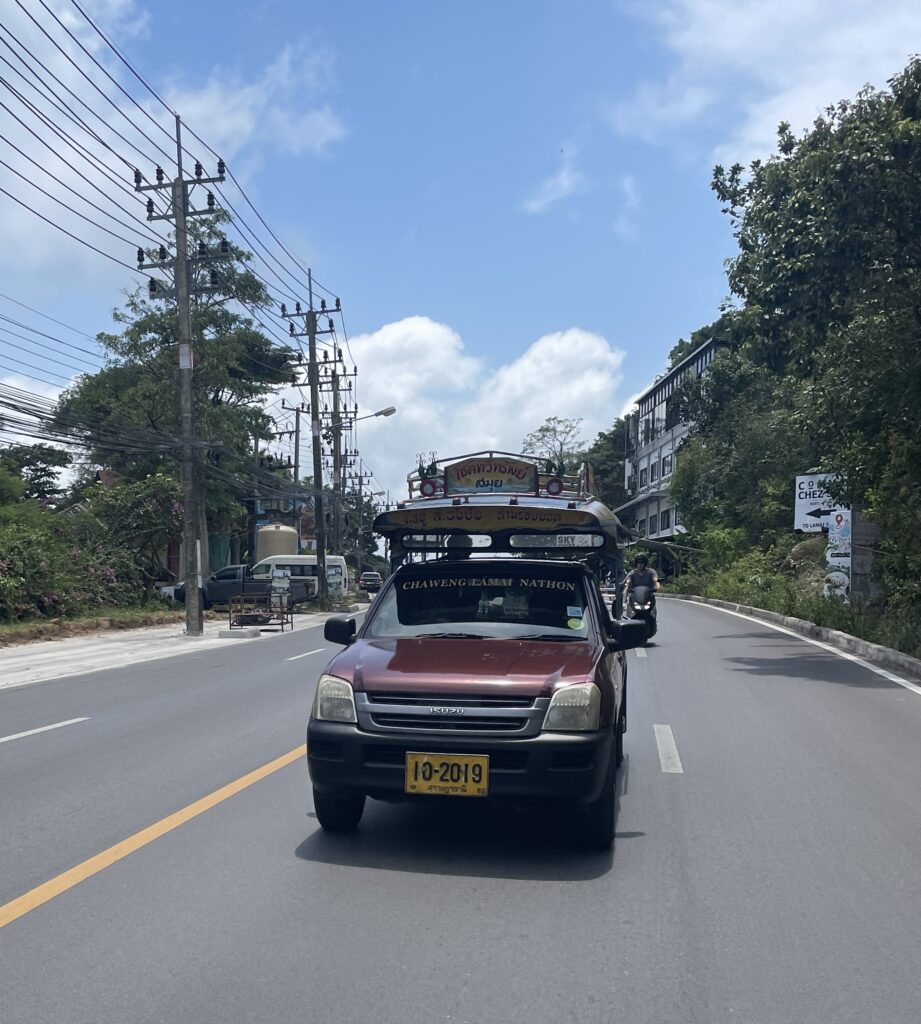
If you want to go somewhere on the island and prefer taking a Taxi or Songthaew, hail one on the street and inquire about the fare.
Once you have agreed on a price with the driver, you hop in and proceed towards your destination. However, upon arrival, the driver may sometimes ask for a slightly higher amount than what was initially agreed upon.
To avoid this scenario altogether, it is recommended that BEFORE getting into a taxi or songthaew, you ALWAYS confirm the agreed-upon price with the driver TWICE. Make sure to communicate the discussed fare clearly with them.
Alternatively, if you want to explore other options for getting around Koh Samui, consider downloading and using Bolt or Grab; both are ride-sharing apps. These apps provide convenient transportation services with upfront pricing information.
The local Songthaew Trucks you see pictured above serve as public transportation in Koh Samui, and you share a ride heading in a similar direction with other passengers for a cheaper ride.
Watch Your Step
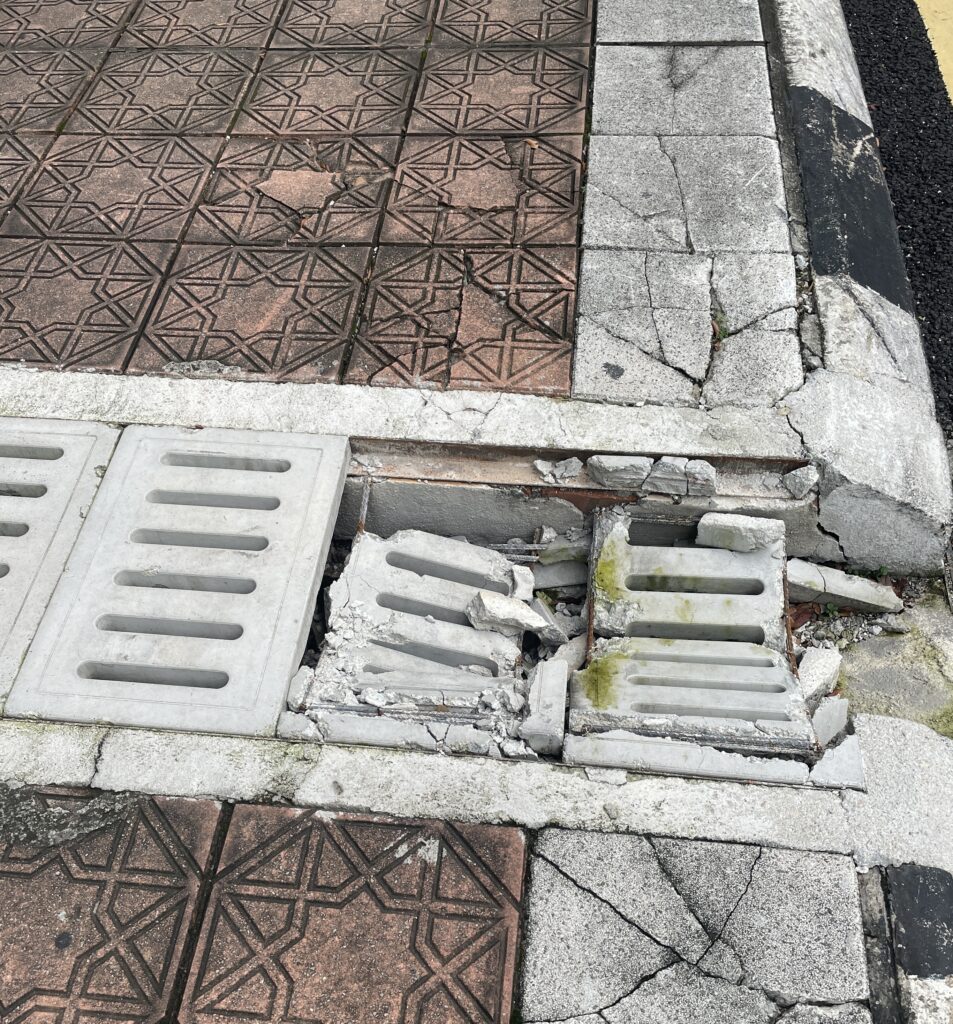
Koh Samui is very well-developed for an island, but despite that, you’ll run into damaged roads, sidewalk cracks, and other hazardous aspects that could cause one to fall and injure oneself.
Honestly, after traveling around many places in Thailand, I’ve noticed this is the case no matter where you go.
Don’t get me wrong, places like Bangkok, Phuket, Koh Samui, and others have well-developed areas where sidewalks are perfect. But it’s never consistent throughout the whole city/island.
Along with watching your step walking around Koh Samui, you should know that some streets you’ll walk on have no sidewalks, so you must be constantly aware of traffic flow.
When walking along streets with no sidewalks, it is advisable to walk against traffic flow. This will enhance your awareness of the ongoing traffic and reduce the chances of any potential accidents.
Scooter/Motorbike Scam
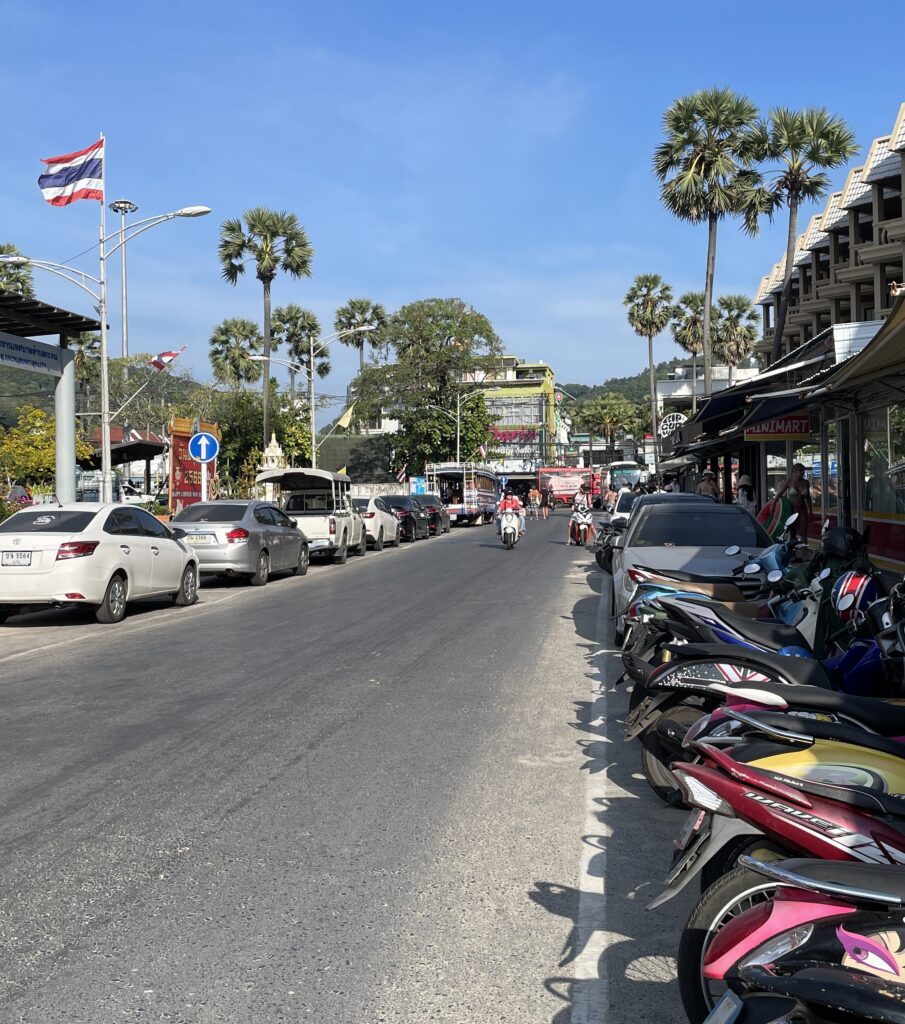
If you’re planning to rent a scooter in Koh Samui to explore various beaches, viewpoints, temples, and more, it’s important to be aware of potential scams you may run into.
One of the most prevalent scams in Koh Samui occurs all over Thailand: the famous scooter/motorbike rental scam.
The common scam goes like this: after renting a scooter from a shop in Koh Samui, you arrive to return the scooter, and someone at the shop then informs you of damages you’ve caused during your rental.
But you haven’t caused any damage, and the shop is trying to scam you out of some extra money. These damage accusations can range from minor scratches and dents to other small imperfections that may have gone unnoticed.
It’s essential to remember that if you haven’t caused any damage, you shouldn’t be held responsible or required to pay for repairs. In such cases, it is advisable to politely refuse their request for payment and assert that you haven’t done anything wrong.
If the situation escalates or becomes difficult to resolve amicably, consider involving the Koh Samui tourist police, as they can help you.
If you’re asked for a deposit to rent a scooter, that’s typical; some shops will say either a deposit or a passport. Don’t ever leave your passport behind with a shop or anyone.
Never leave your passport as collateral for any sort of rental in Thailand.
A helpful tip is to take a detailed video of the scooter using your phone before riding off with your rental to avoid potential disputes over damages upon returning the scooter. This way, you’ll have visual evidence if false claims are made against you.
Stay Hydrated
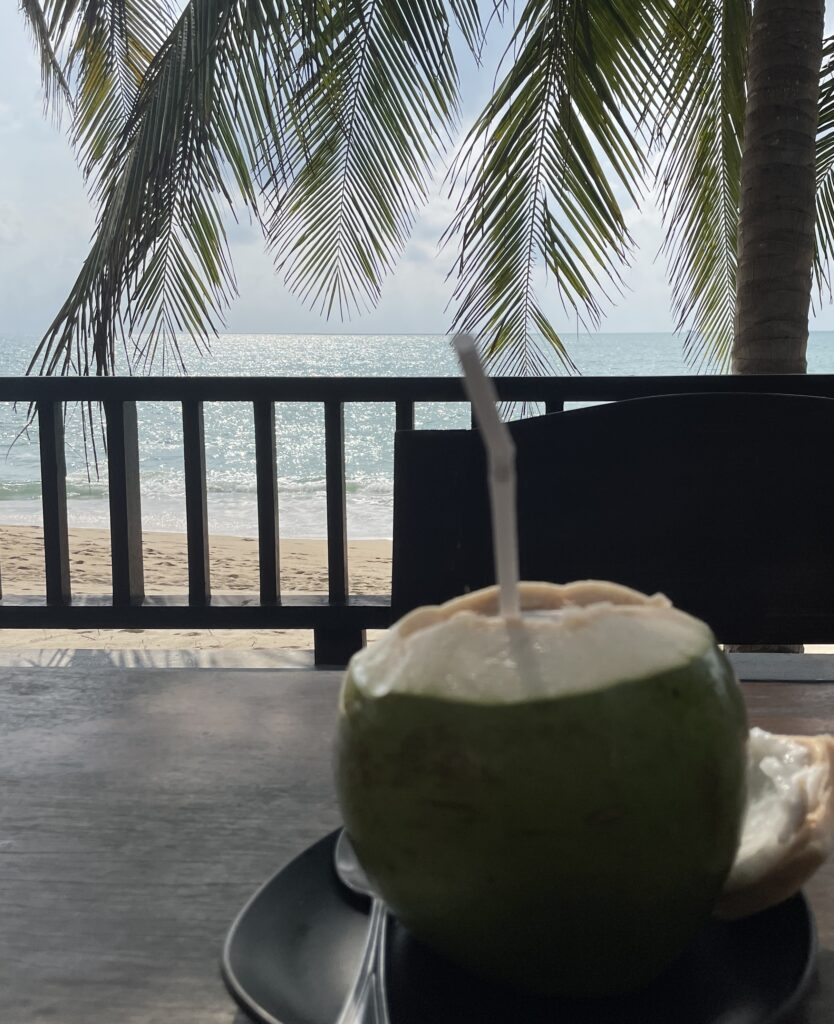
Koh Samui is known for its tropical climate and high temperatures for some months. It is crucial for visitors to stay hydrated while visiting Koh Samui. The hot and humid weather can cause excessive sweating, leading to a depletion of body water levels.
In Thailand’s hot climate, the risk of dehydration and heat exhaustion is significantly higher due to increased fluid loss through sweating all day. Drinking plenty of fluids throughout the day is recommended to replenish lost water and electrolytes.
While water is the best choice for hydration, it’s important not to assume that fruit juices and cocktails will keep you well-hydrated because they won’t.
Another excellent option is fresh coconut water from a coconut. This natural beverage helps with hydration and replaces electrolytes lost through sweat. Coconuts for sale can be found everywhere in Koh Samui!
You’ll find stores or 711’s selling water and various other drinks near most beaches. If there are no stores, you’ll often come across vendors on the beach who are selling water or coconuts.
Stay hydrated when visiting Koh Samui or any beach destination in Thailand, particularly during the hotter months in Koh Samui from March through August.
Avoid Soi Dogs (street Dogs)

They’re known in Thai as “Soi dogs,” which translates into street dogs or stray dogs in English.
Visitors from the West side of the world or Europe may be tempted to pet the many street dogs, but it is advised not to do so.
Understand that some of these dogs sometimes have rabies and can become aggressive, especially if hungry. It is important to remember that they are street dogs.
Soi dogs search for food more actively during nighttime than during the day. While attacks by street dogs are rare in Koh Samui, they do occur from time to time, especially at night on a quiet street not near a populated area.
Depending on where you stay and visit Koh Samui, you may not encounter stray dogs.
However, if you explore different areas of the island, as I recommend you do, it is crucial to be vigilant about stray dogs during nighttime. If you get bitten or scratched by any dog, you must go to the hospital to receive several rabies shots.
Pickpocketing
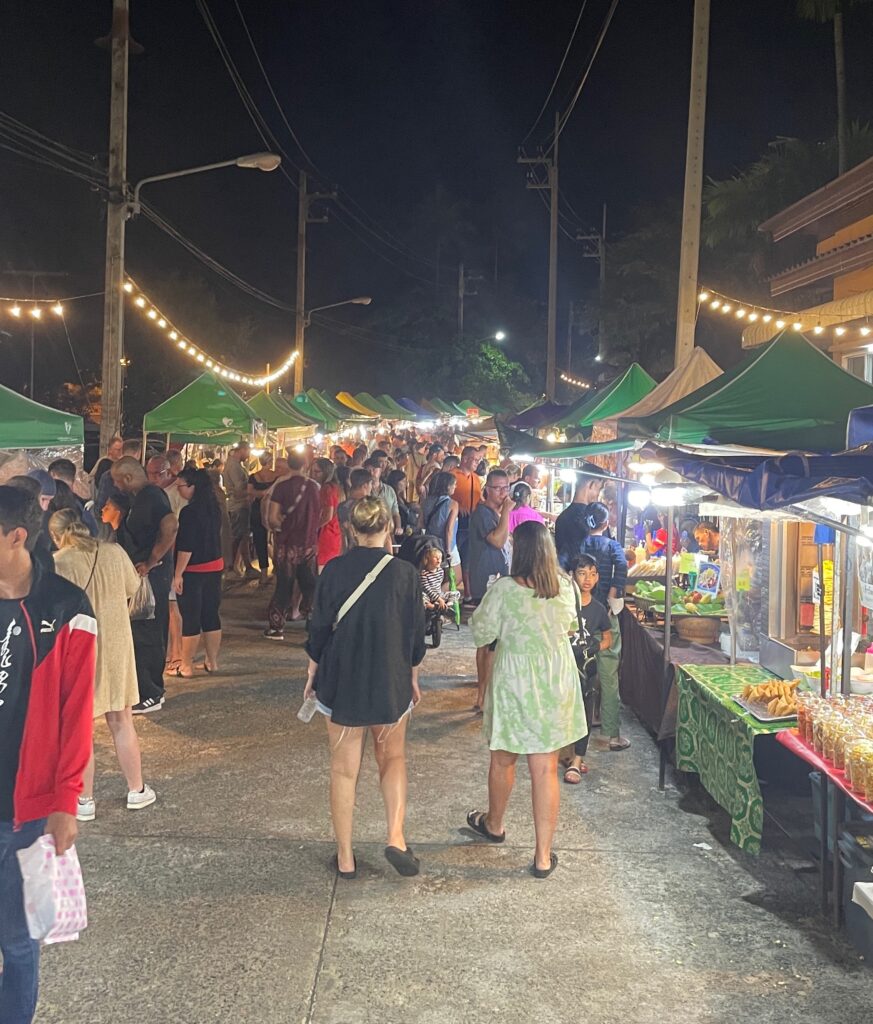
Pickpocketing isn’t common in Koh Samui and is far less common compared to places like Bangkok and Pattaya.
But it’s still advised to keep an eye out for pickpockets, especially in crowded areas.
When visiting any night markets in Koh Samui, this is where you’re most likely to get pickpocketed if it does happen.
Like pickpocketing, keep an eye out for your things at the beach. It could be another tourist or possibly a local who could quickly snoop in your bag and steal something.
Jetski Scam
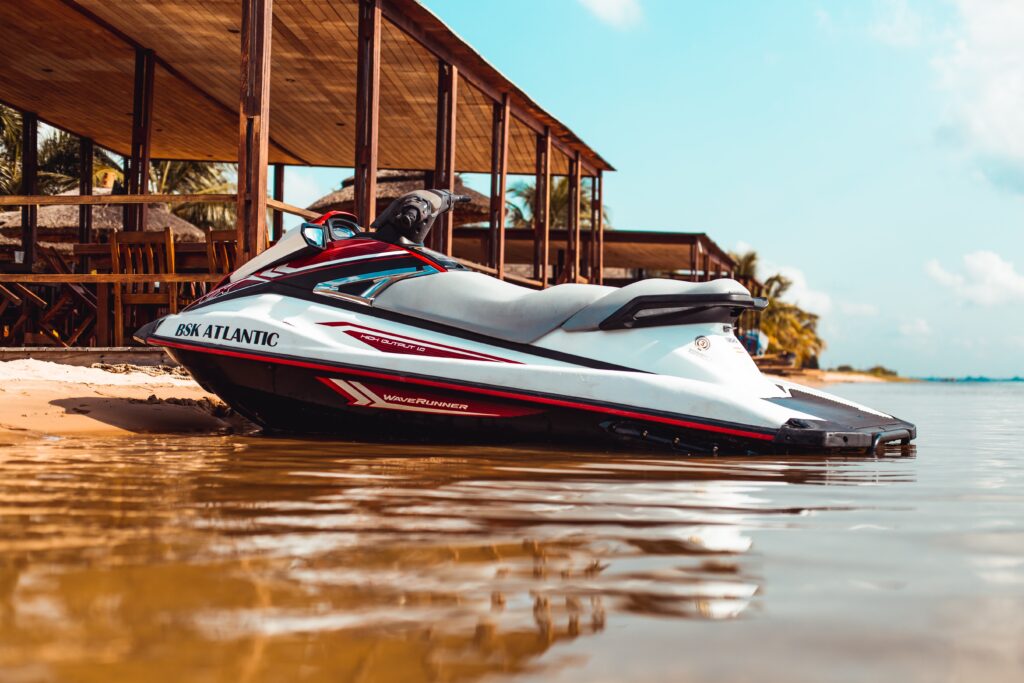
The jetski scam is similar to the scooter rental scams I mentioned earlier in this article. It stems from a false accusation.
You’re having a fun, relaxing day at the beach and decide you’d like to rent a jet ski for a bit and ride the waves. The cost is decided on with the gentlemen renting out the jetskis, and you’re on your way.
Once you’ve returned with the jetski, the man states you’ve caused a scratch or damaged dent on the jetski while you were riding it, telling you that the damage wasn’t there before and you must pay.
He’s scamming you out of money for no reason because you’ve caused no damage whatsoever.
Don’t be rude, but politely decline, and if they’re persistent, let them know you’ll be getting the tourist police involved because their accusation is false.
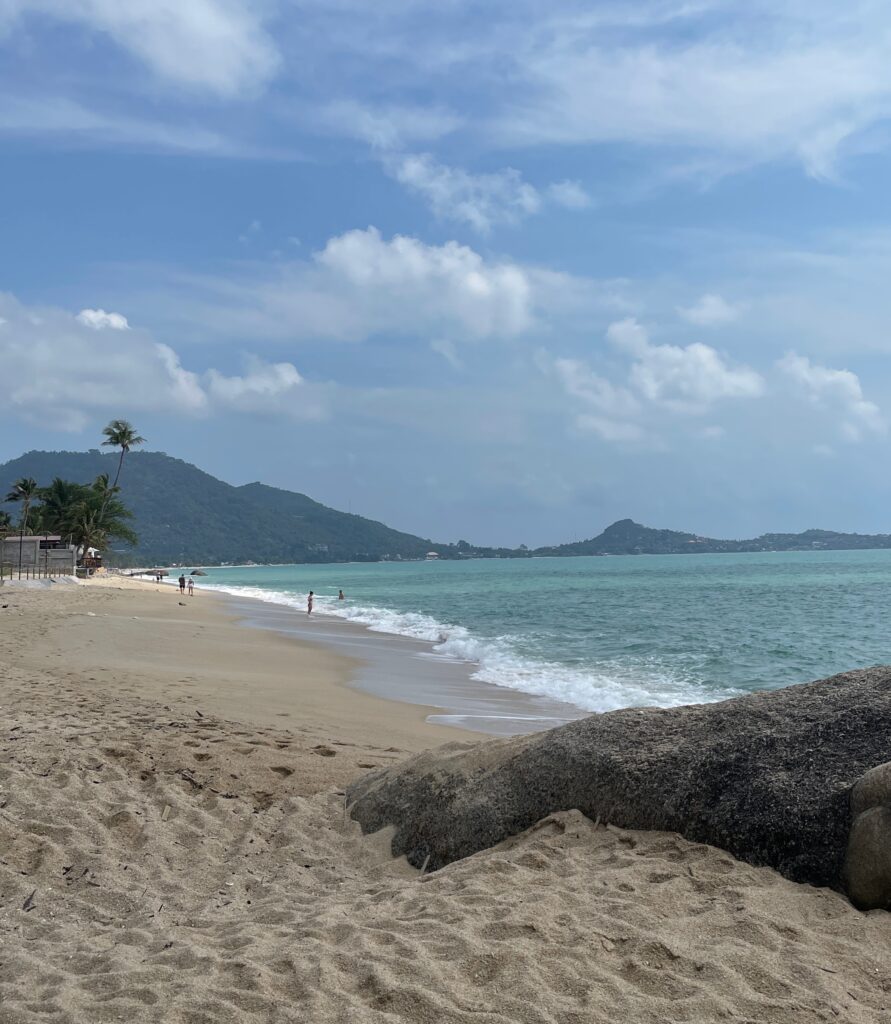
Where to Stay in Koh Samui
Chaweng Beach: This is the most popular area to stay in on Koh Samui. Countless bars, restaurants, shopping, hotels, and hostels are nearby. On the extensive long beach shoreline of Chaweng, you will find several restaurants and beach bars.
Kimpton Kitalay – 5 Star / Famous for its spacious rooms, many restaurants, a luxurious spa, and much more. The Kimpton Samui is in an excellent location on Koh Samui
Samui Resotel Resort – 4 Star / Cozy resort with spacious rooms and a stunning rooftop located along Chaweng Beach, near many restaurants and shops
Lub d Koh Samui – 3 Star / A perfect hotel for a younger crowd, located right on the popular Chaweng Beach, Lub D Samui is close to the central part of Koh Samui
Bo Phut Beach: Also, the area of the Fisherman’s Village, Bo Phut Beach is a calmer area full of couples and families visiting. It’s only 15 minutes from Chaweng Beach and Central Samui, the island’s main shopping mall.
Ibis Samui – 4 Star / Located right along Bo Phut Beach, the Ibis is an excellent location ideal for families, with a beautiful pool overlooking the sea
P&T Hostel / Those visiting on a budget, look no further. This is the cheapest and highest-ranked hostel on the island. They’ve got everything you need, even a restaurant in the hostel
Lamai Beach: A Calmer beach area with several restaurants, shops, and hotels nearby. The area is full of expats and, on average, has a more mature crowd.
Pavilion Samui Villas and Resort – 4 Star / Located centrally in Lamai Beach, this resort offers stunning modern villas for guests to enjoy by the beach
4U Resort Samui – 3 Star / Convenient mid-range beachfront hotel on Lamai Beach
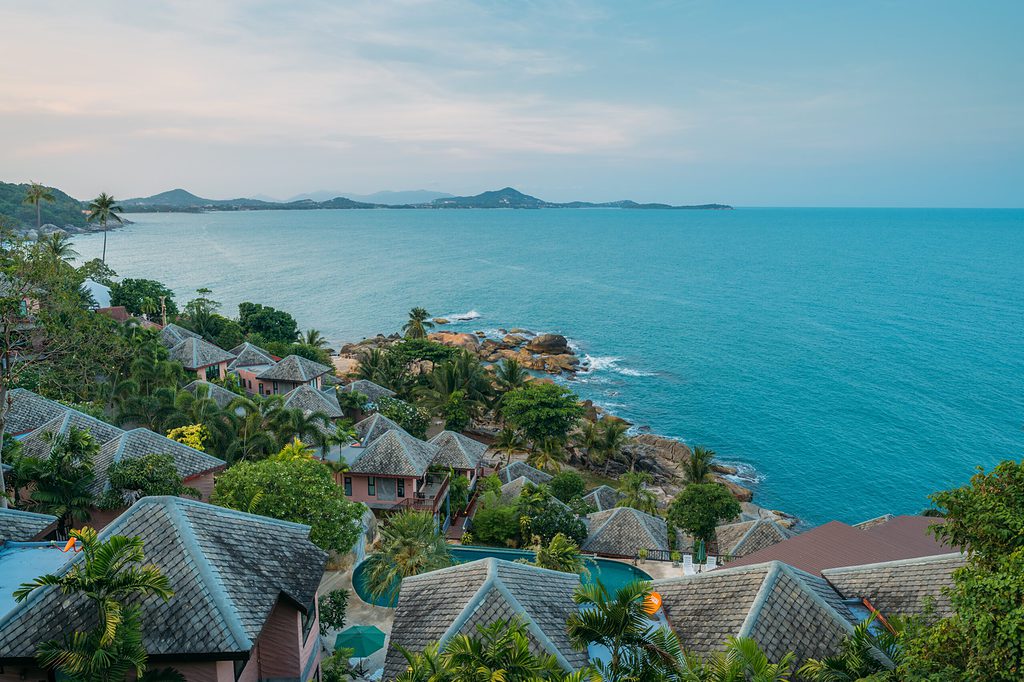
Is Koh Samui safe? — Final Thoughts
So, is Koh Samui safe for tourists? Yes, it’s perfectly safe for all visitors. The island is very well developed, and its main areas tend always to have tourists/locals walking around.
The main areas, like Chaweng and Lamai, have tight-knit communities, and it’s an island best described as simple living. That being said, be aware of everything mentioned above if you’re a visitor.
For those wondering, is Koh Samui safe for families? Yes, Koh Samui is perhaps the safest island to visit with your family; the island is most popular with honeymooners and families.
If you encounter any problems, contact the Koh Samui Tourist Police. You can dial the number at 1155 to reach them.
What to avoid in Koh Samui?
Be careful of a few common scams in Koh Samui, like the scooter or the jetski scam.
If you’re at a beach with red flags, avoid entering the water; the red flag is there for a clear reason.
Is Koh Samui safe for solo travellers?
Yes, Koh Samui is perfectly safe for all solo travelers. It’s best to stay in an area where others are nearby, like Chaweng, Lamai, or Bo Phut Beach.
Is it safe to walk in Koh Samui at night?
Walking around at night in Koh Samui is safe, especially in the typical tourist areas of Lamai, Chaweng, and Bo Phut Beach.
However, if you’re walking in any of the areas between these beaches, watch out for street dogs and be careful of ongoing traffic. Many streets in the lesser developed areas don’t have sidewalks.
What is the crime rate in Koh Samui?
The crime index is 29.60 in Koh Samui, according to Numbeo, which is considerably low. Koh Samui is perfectly safe during all times of the day!

